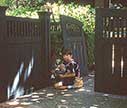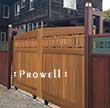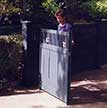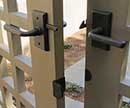
PORCH SWING SPECIFICATIONS
* Prowell Woodworks is a product-based company. We are not available for site visits.
Printed Installation Guides and Working Drawings arrive with all shipped or delivered orders
PORCH SWINGS SPECIFICATIONS
Prowell’s Porch Swing specifications represent the only product that bears some attention to physical liability. Please take care to hire someone sufficiently qualified to install your swing. This would involve accessing the overhead supports for proper load-bearing properties.
![]()
PDF Downloads
* Step by Step Full Installation Text
Various Mounting Applications
* Mounting with Chain
*Mounting with Rope
*Mounting to Stand #1
*Mounting to Stand #2
The Front Porch Swing has over the centuries become an icon of American Culture. It represents leisure, associated with conversation and the long warm evenings of a pace often linked with a bygone era. Let’s spend just a few moments to insure your Porch Swings specifications are followed and your conversations don’t risk being truncated with a crashing blow to the porch floor itself.
Prowell’s Porch Swings include the following hardware components:
1) A pair of 60″ x 3/16″ welded, coated chain. (Or optional 1/2″ white cotton rope w/brass crimps)
2) Six Clevis Pendulum Connectors
3) Two Heavy duty Swing Springs.
4) Two Optional swivel mounting brackets (depending on your framing configuration)
 PORCH SWINGS SPECIFICATIONS—CHAIN SUPPORTS
PORCH SWINGS SPECIFICATIONS—CHAIN SUPPORTS
Coated Chain with Clevis Pendulum Connectors and two 6′ lengths of uncoated chain. The chain and connectors arrive fully assembled and require only a connection to the springs and swivel-mounts on the ceiling beams.
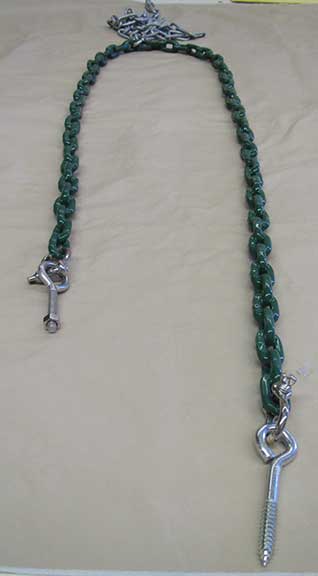
Typical connection at the Y. Stainless clevis pendulum connector.
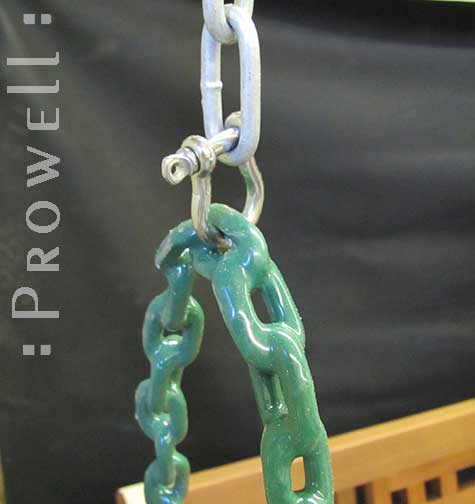
The swings with chain support arrive with the chains bundled and fully assembled. Requiring only the connection to the overhead springs and swivel mounts.
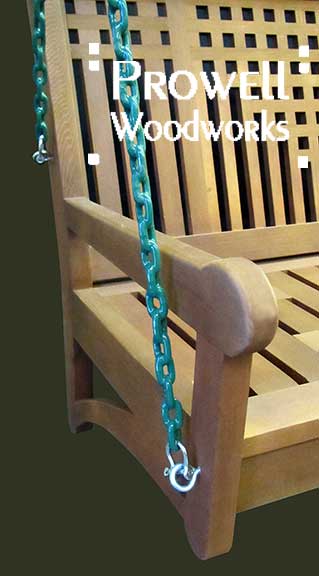
 WOOD SWING SPECS—SWIVEL-MOUNTED PLATES AND SPRINGS
WOOD SWING SPECS—SWIVEL-MOUNTED PLATES AND SPRINGS
Bolts or Lags not Included
The swivel mounting plates are primarily applicable to those sites with appropriate framing specifications. They provide a little extra swing ease, and are best utilized when the swing is parallel to the overhead mounting joists. Because every site is different, with some requiring lags and others machine bolts, as well as the widths of various framing members, the type and specification of the actual mounting bolt is best left to the installer’s discretion.
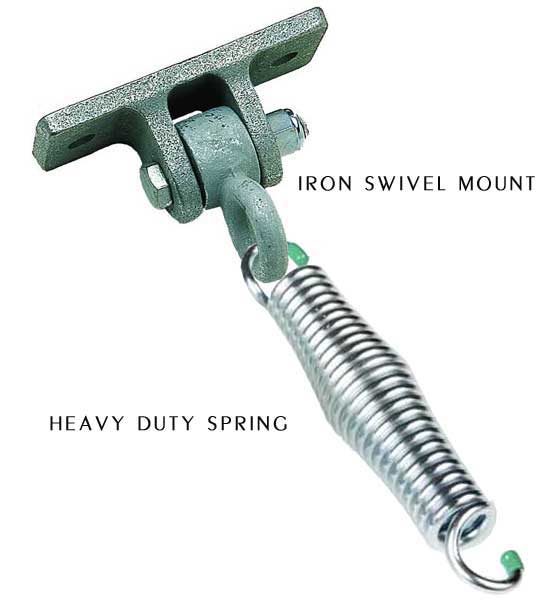
 OUTDOOR SWING SPECS–ROPE SUPPORTS
OUTDOOR SWING SPECS–ROPE SUPPORTS
Rope supports are an optional application, relegated to Porch swings. Fully exposed outdoor swings are better served with the coated chain supports.
Double braided ½” diameter nylon rope. Connecting to the swing, on the right, with the threaded loop. On the left, showing the loop, provided by the manufacturer Knot and Rope Supply. Prowell provides four 8′ lengths, four Clevis Pendulum Connectors connecting the rope to the swing itself. All connections are shipped or delivered so that the rope simply loops onto the spring that mounts from the ceiling connection.
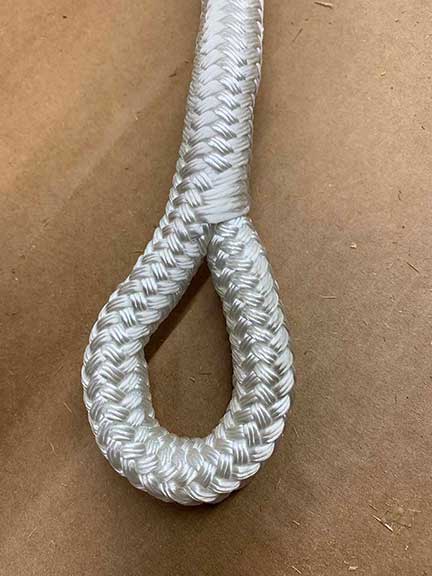
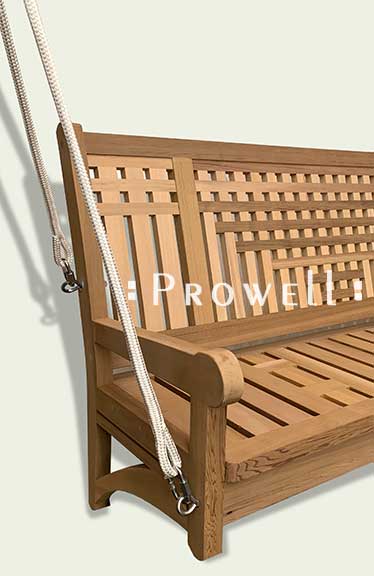
Brass Rope Crimps
The Crimps are best crimped with a vise or large vise grips.
If they are crimped to a rope diameter less than spec’d, the brass may crack.
The crimps are sourced through local horse and saddlery shops, where it is used for leader-rope to withstand 650 lbs of pressure drawn potentially by, well . . . a wild, full-grown horse.
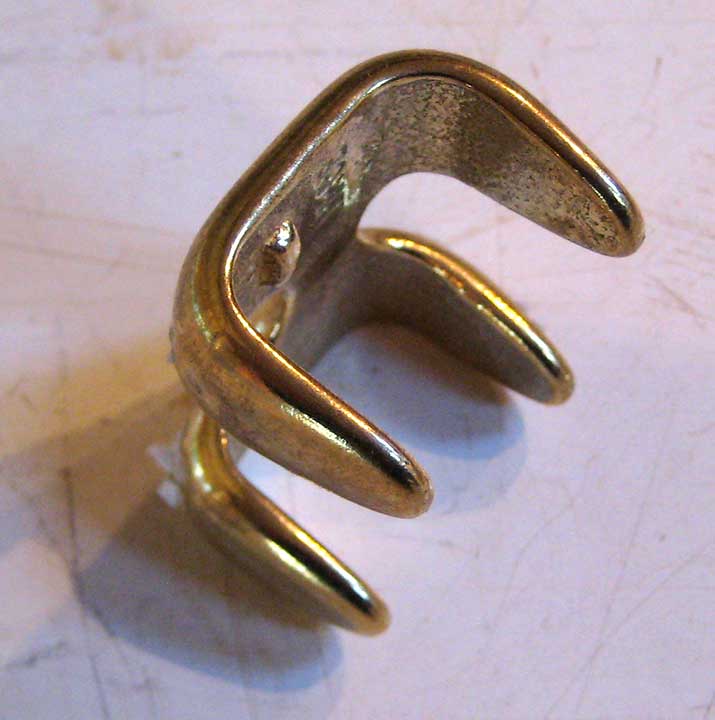
PORCH SWING SPECIFICATIONS–ROPE ILLUSTRATIONS
The porch swing specifications for rope supports arrive with the rope bundled. The connections to the I-Bolts on the swing is made easy with the Clevis Connectors provided and in place. The connection at the ceiling requires crimping the provided brass crimps, securing the rope to the overhead connection. This often can require either a bench vise or large channel locks.
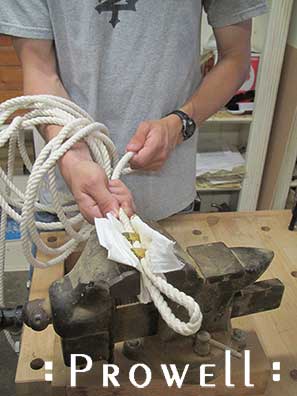
Foregoing the green swivel mounts to secure the spring directly to the ceiling framing. The rope support is a continuous loop, crimped about 12″ below the spring to prevent an unchecked pivot.
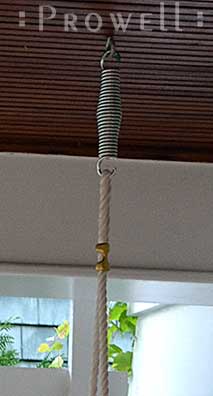
Rope support is often a single loop to the ceiling mounted springs, forgoing the swivel mount.
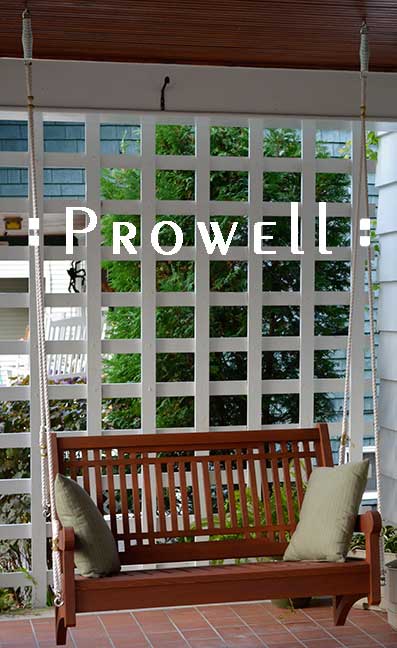
Illustrating a few basic principles regarding Porch Swing Specifications for Installation
Chain Support
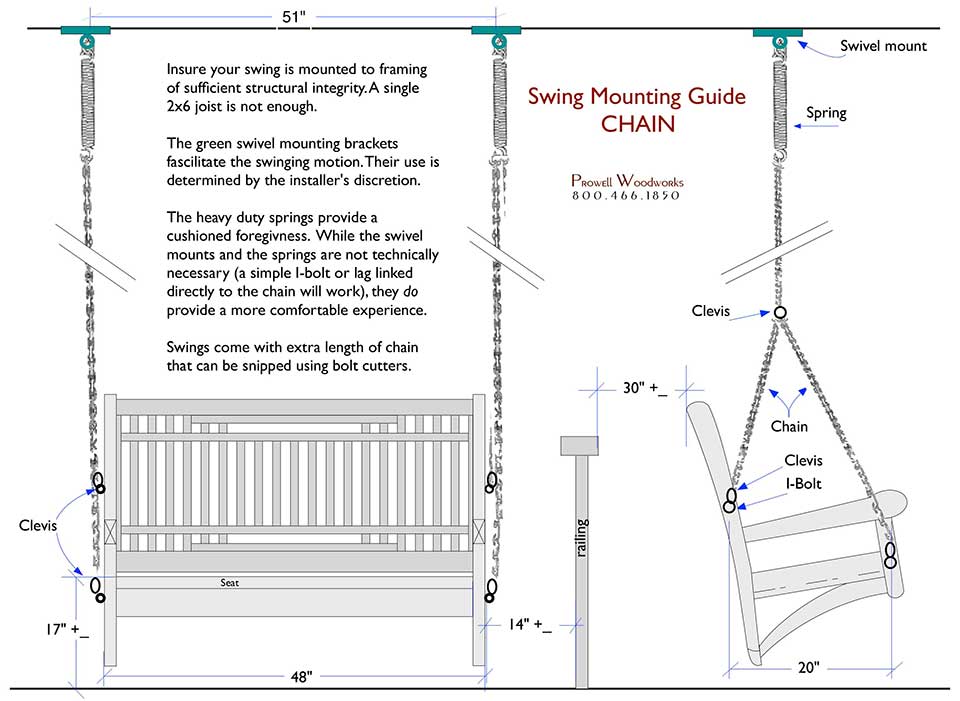
Rope Supports
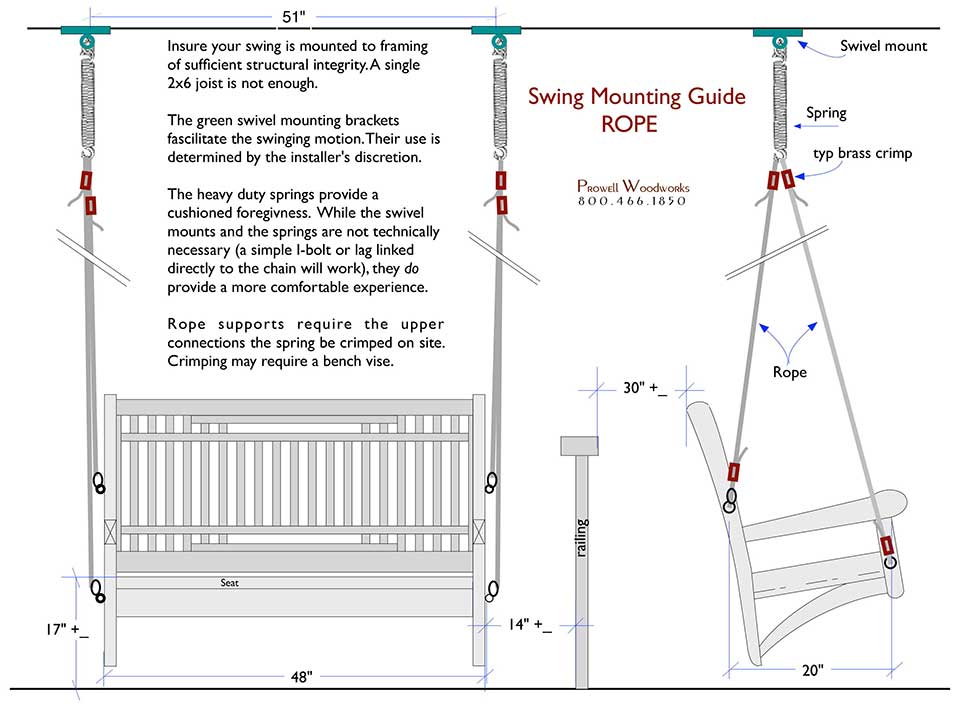
Outdoor Swing Specifications for Prowell’s Swing Stand #2
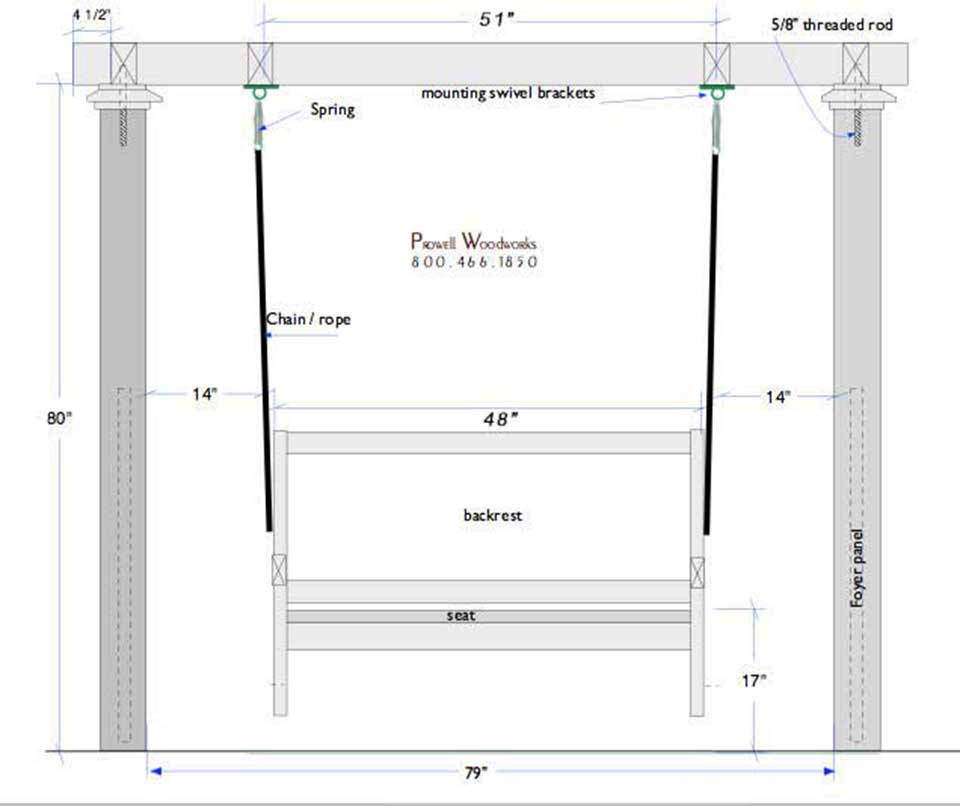
Porch Swing Specifications– Installation Guide
Always measure your porch or patio ceiling for height. This is to determine the length of the swing chains. Choose a wide area for swinging back and forth. Be sure to set the bolts with enough clearance from your porch rail to avoid striking the railing.
A standard is about 12″-16″ from the railing. Locate a solid overhead beam and install two bolts or lags spaced 3″ further apart than the width of the swing to hold chains (this is to insure the chain or rope does not burnish against the side of the swing). If using lags, drill pilot holes slightly less in diameter than the lags. This not only prevents the wood from possibly splitting, but insures the lags have a good thread purchase into the wood.
When setting the Porch Swing in place, there is plenty of forgiveness to adjust the eventual height by simply moving up or down the length of the chain. A average height from the floor to the seat of the swing would be about 17 inches.
If you are using rope, the rope will ship already mounted to the swing in two lengths per each side of the swing. These two lengths are commonly tied off at the brackets or spring within the overhead framing. It is acceptable for each rope to tie off individually to a pivot or carabiner, but being careful to insure the lengths of each rope make for a balanced swing.
Check that your hardware is installed correctly before testing your swing.
* DON’T leave children unattended in a swing or let them stand up on a swing.
* DON’T hang or support swings from brick or masonry.
• ALWAYS hang the swing from solid framing.
A typical 60″ swing will weigh approximately 80 lbs.
PRODUCT SPECIFICATIONS NAVIGATION
![]()

